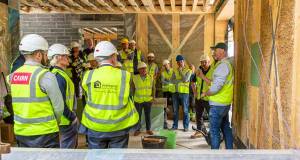
- Marketplace
- Posted
Final opportunity for construction professionals to secure 80 per cent training subsidies
This article was originally published in issue 50 of Passive House Plus magazine. Want immediate access to all back issues and exclusive extra content? Click here to subscribe for as little as €15, or click here to receive the next issue free of charge
The Digital Academy for the Sustainable Built Environment (DASBE) is offering what may be the last opportunity for workers to access 80 per cent fee subsidies on critical upskilling courses before the construction sector faces mandatory sustainability requirements.
With building regulations becoming increasingly stringent and climate targets driving industry transformation, professionals who miss this opportunity may find themselves at a significant disadvantage in the evolving marketplace. Launching in September 2025, this could be the final chance to gain essential credentials at such heavily subsidised rates.
DASBE addresses three critical skill areas that will become mandatory for many construction roles: energy efficiency, circular economy principles, and digital construction technologies. As Ireland moves toward net-zero buildings and retrofitting existing stock, professionals without these competencies risk being excluded from major projects.
Heat pump installation and commissioning skills are particularly crucial, given the government's commitment to phasing out fossil fuel heating systems in new dwellings. Certification is available in domestic heat pump installation, commissioning, maintenance, and servicing – skills that will be in high demand as the technology becomes standard in new builds and retrofits.
Building Information Modelling (BIM) training represents another critical opportunity. With BIM becoming mandatory on public sector projects above certain thresholds, professionals lacking these digital skills face exclusion from significant contracts. The DASBE programme offers multiple BIM pathways, from basic architecture applications to advanced MEP (Mechanical, Electrical, and Plumbing) systems integration.
The 80 per cent subsidy makes these Level 6 to Level 9 courses accessible with minimal financial commitment. However, this funding is time-limited and linked to specific government priorities. Industry sources suggest similar subsidy levels are unlikely to be available again, making this September intake particularly valuable.
Course flexibility accommodates working professionals through online delivery and modular structure. This recognises that construction workers cannot afford extended periods away from employment but must still acquire new competencies to remain relevant.
The partnership between Technological University of the Shannon (TUS) and Atlantic Technological University (ATU), supported by the Irish Green Building Council and Tipperary Energy Agency, ensures courses meet immediate industry needs. This collaboration has produced training that bridges the gap between academic theory and practical application.
Whole life carbon assessment and circular economy principles are becoming essential for planning applications and building certifications. Professionals equipped with these skills will be positioned to lead sustainable construction projects, while those without may find themselves relegated to declining traditional practices.
The programme's connection to European initiatives through projects like Construction Blueprint and BIMzeED ensures Irish professionals receive internationally recognised training. This global perspective becomes increasingly important as construction companies compete for international contracts.
Career progression pathways are clearly defined, allowing professionals to build qualifications systematically. Starting with foundational certificates, participants can advance to higher levels, creating clear advancement opportunities within the sustainable construction sector.
Applications for the September 2025 intake are available at dasbe.ie. Given the limited places and unprecedented subsidy levels, early application is strongly recommended. This may represent the final opportunity for construction professionals to future-proof their careers through comprehensive, affordable sustainability training before market forces make such skills essential rather than optional.
DASBE is funded by the Higher Education Authority’s HCI Pillar 3, a government programme designed to meet priority skills needs, by increasing collaboration between higher education and enterprise with a focus on innovations in teaching and learning.







